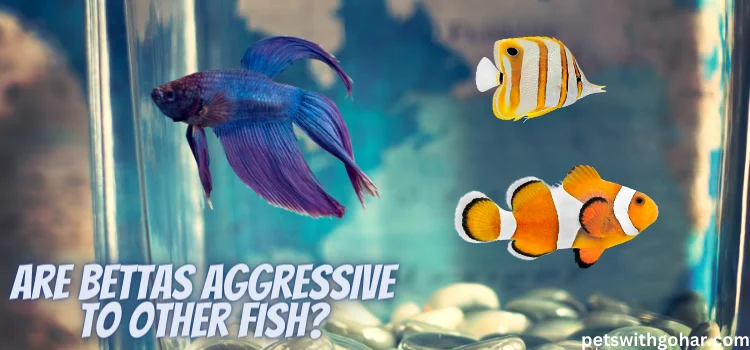Yes, betta fish are known for their aggressive behavior towards other fish. Their territorial nature, especially among males, makes them prone to confrontations, often leading to fights when placed in the same tank with other species.
This aggression is a natural survival instinct, and fish owners must consider this trait when creating a peaceful aquarium environment. Below this article, we discuss this in more detail.
Are Bettas Aggressive to Other Fish?
Betta fish, also known as Siamese fighting fish, exhibit high aggression towards other fish, particularly those of the same species.
This aggression is primarily due to their territorial nature. Bettas tend to claim a certain area in the tank and defend it fiercely against intruders, often resulting in violent confrontations.
Understanding Betta Fish Aggression
While this aggressive behavior can seem alarming, it is a natural survival instinct ingrained in bettas.
In the wild, maintaining territory is essential for bettas to ensure they have sufficient resources for survival, such as food and a suitable breeding spot. This behavior becomes amplified in a confined space such as a home aquarium.
Aggression Towards Other Species
It’s not just other bettas that can trigger this aggression. Bettas can also be aggressive towards other fish species, especially those with similar characteristics to bettas, such as bright colors or long fins. Such species can be perceived as threats, triggering an aggressive response in bettas.
Mitigating Betta Aggression
Fortunately, several steps can be taken to reduce and eliminate this aggressive behavior. Firstly, selecting a larger tank for bettas is important as they need plenty of room to swim around and spread out their territory.
Additionally, providing bettas with enough hiding spots helps them feel secure in their environment.
Finally, avoiding placing other fish species in the same tank as bettas is best. If this is unavoidable, several fish species have been proven to coexist peacefully with bettas, such as gouramis and danios.
Socializing Betta Fish with Other Species
In some instances, introducing other species into a betta’s tank may be beneficial – if done correctly.
If introduced gradually, other species can be used to socialize bettas and help them become accustomed to non-threatening fish.
This process is best done in a large tank with plenty of plants, shelters, and hiding spots. The other species must not be similar in size or shape to bettas, which could trigger an aggressive response.
Are Betta Fish Aggressive to Goldfish?

In a nutshell, betta fish can indeed show aggression towards goldfish. Goldfish and betta fish have different habitat needs and lifestyles that can contribute to conflict.
Goldfish, being cold-water fish, thrive in lower temperatures, while bettas, tropical fish, require warmer temperatures.
This difference in environmental requirements can cause discomfort and stress for both species, potentially triggering aggressive behavior.
Furthermore, goldfish tend to be slow swimmers and have long, flowing fin characteristics that can be perceived as a threat by betta fish, known for their territorial nature. Consequently, the betta fish might exhibit aggressive behavior towards the goldfish.
Lastly, goldfish and bettas have different dietary needs. Goldfish are omnivores, eating both plants and small crustaceans, while bettas are primarily carnivores, feeding on insects and larvae.
This difference in diet can lead to competition for food resources, enhancing the likelihood of betta aggression.
Which Betta Fish is More Aggressive? (Male or Female)
When it comes to betta fish, aggression tends to differ between genders. Male bettas are typically more aggressive than their female counterparts.
This heightened aggression is predominantly seen when two males are in the same vicinity. They are known to fight to the death to defend their territory.
The males display this hostility to demonstrate dominance and discourage competition, particularly for mating rights.
On the other hand, while female bettas exhibit some level of aggression, it is considerably less intense than males.
Females can live together in the same tank, referred to as a “sorority,” if it is large enough and contains plenty of hiding places. However, their compatibility can vary, and some may display aggression towards each other.
Despite these general trends, it’s important to remember that individual betta personality varies, and exceptions to this male-female aggression disparity exist.
Some females can be equally aggressive as males, while others may be more passive. Therefore, monitoring your betta fish’s behavior regularly is crucial, especially when introducing new tank mates.
Conclusion.
Every betta fish is unique, and their personalities can deviate from these typical behavioral tendencies.
Regular monitoring and understanding of your betta fish’s behavior can ensure a safe and harmonious aquarium environment.
Remember, a well-informed fish keeper is the best kind, encouraging a healthy and happy life for your aquatic pets.
Frequently Asked Questions.
Are all betta fish aggressive to other fish species?
While it is generally true that betta fish can be aggressive, especially the males, each has a unique personality. Some may display more passive traits, while others may be more aggressive. It’s important to monitor the behavior of your betta fish, especially when introducing new tank mates.
Can female bettas live together in the same tank?
Female bettas can coexist in the same tank, often called a “sorority,” as long as it is spacious enough and provides sufficient hiding places. However, their compatibility can vary, and they may also exhibit aggression towards each other.
Can betta fish coexist with any other fish species?
Betta fish’s aggressive nature makes them unsuitable as tank mates with many other fish species. However, this depends largely on the individual personality of the betta fish. Regular monitoring and understanding of your betta fish’s behavior is crucial when introducing new species into your aquarium.
How can I reduce betta fish aggression?
Reducing betta fish aggression can be challenging, but providing ample space, hiding spots, and maintaining optimal water conditions can help. It’s also important to avoid housing male bettas together or with fish that have similar appearances, as this can trigger territorial behavior.

